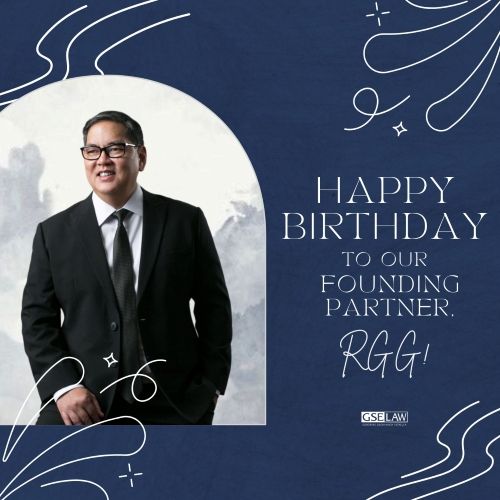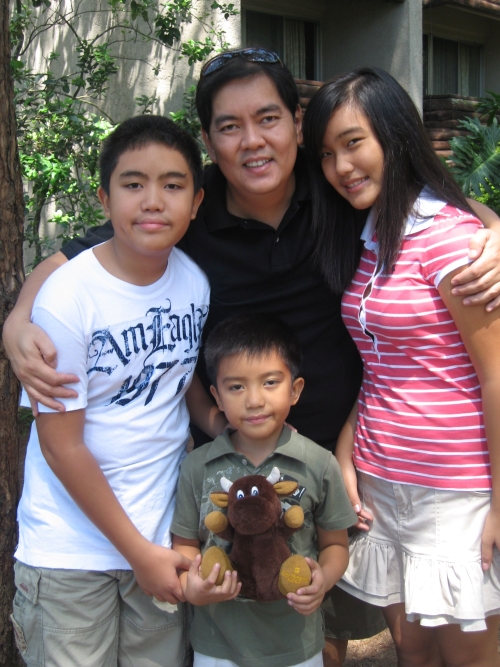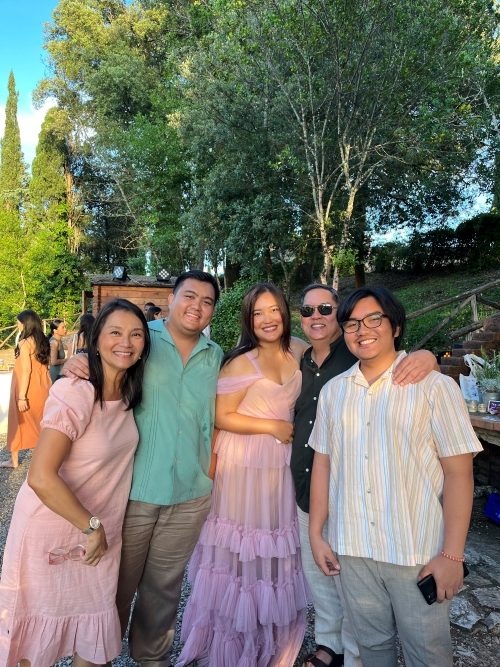
25 June 2024 – HAPPY BIRTHDAY TO OUR FOUNDING PARTNER, RGG!
The world has evolved. It’s not as simple as it used to be. For them, “you only live once” is so true, especially with the pandemic.
By most measures of success, Raul Gerodias and his wife, Becky, would be considered successful parents. They are parents to three thriving children. Nina, 31, works at Procter & Gamble and is now based in Dubai after a 4-year stint in Singapore where she met her husband, Tommaso. Gino, 29, a lawyer, is with the Litigation Practice Group of ACCRALAW. After graduating from Ateneo with a BS Management Engineering degree, Jerico or Jico, 23, joined Ideo Studios, a digital marketing and creative media company.
Conventionally speaking, the role of parents is to raise quality children, have them complete their education, and send them into the world to live out the lessons they are taught by their parents and the environment they were brought into. What lessons we are to teach and the quality of the environment we provide can be a result of generations of parenting in the past and new sensibilities in the present. Raul, like many first-time parents, was at a loss in the beginning.
“During the firstborn child, there were no guidelines. You go by instinct and learn on the job. When you have a couple, you have more or less already conceptualized. When Jico was born, I knew what to expect.”
Now that his children are older and more experienced, Raul is at a stage where he has to watch them live their lives. He claims to be a very independent person, and as a result, his parenting style mirrors that. “This generation is different. During our time there was more pressure to conform. You have to get married, have kids, own a house, own a car, have a stable job. Now they are very different. They’re not after all this. They focus on relationships and experience. I always say in my mind now that we have millennials and gen zs in the office and not to judge what is right or what’s good. Whatever they are experiencing or feeling, this is valid. This is their generation.”
Still, as Raul laid out the general conventions of his time, he admits that he lived in and out of these conventions. “I took my master of laws in the U.S. at UPenn in ‘97 and left Becky home to take care of 2 young kids. Nina was 5 and Gino was only 2 years old. People asked me about it because it was a no-no in our generation. I was unconventional as a father because I had no preconceived notions about it. I made and lived by my own rules.” Many would say, he still does.
Delving into his past, we investigated his experiences with his own father and the influence on him and his parenting style. When Raul was a teenager, his parents moved to the U.S. while he remained in the Philippines with his older siblings. And while his siblings were tasked to watch over him, Raul, mostly went day-to-day on his own. “I think largely because I grew up very independent and with very little advice, guidance, or parental supervision, I appreciated that I was given a lot of freedom and was allowed to make decisions on my own. My parental style developed because my parents allowed me a lot of independence. The independence my parents gave to me, I adopted that as my style.”
Raul believes that his experiences led him to who he has become and wants to give that level of autonomy to his children. “I want to give them their independence, I want them to make their own decisions, and learn from their own mistakes. I have very little say in what they want or choose to do. If they consult me, I will give them advice, otherwise, I let them live on their own.”
Good character is the baseline that will allow them to make better decisions.
While Raul’s parenting style can be summarized as “live and let live,” the one proviso Raul has in raising his children is the quality of good character. “The most I became conscious of when I became a parent was building character. For me, for them to be responsible, my yardstick, my measure, more than anything is to build character.”
He knows that they will be put in many situations where they will have to decide. He believes that good character is the baseline that will allow them to make better decisions. “I believe children are born with their own personalities. We are all unique but character is something you develop. It evolves. They need to have the fundamentals in-depth.”
When asked if he thinks he did a good job building their character and if his children abused his trust, Raul shrugged and answered in a way indicative of his style. “They haven’t done anything for me not to trust them. So, I don’t know. I also would not be surprised.”
Raul makes no illusions as to the type of father he is. He defiantly declared he was definitely not a helicopter parent. He does not dote on his children. He does not pester his children or ask them where they are or when they are coming home. “I was not the type of father to change diapers, wake up in the middle of the night, or give them a bath. The running joke in the office when I said that my kids were so good was that I wouldn’t know because I never handled them.”
He defined himself as a “weekend father.” Weekdays were spent working hard and the weekends were for watching movies, trying out new restaurants, voice lessons, swimming, taekwondo (Gino is a black belt), soccer, and the like. They went on staycations before that was even a thing, staying in hotels around Metro Manila. The weekend staycations evolved into out-of-town trips until finally, out-of-country trips. “As they got older, there was never a year we didn’t go somewhere. For many years, I didn’t see many of my friends.”

My father didn’t make it easy for me. He made me work for it.
Raul had a rather vague concept of fatherhood in the beginning. “I had no idea about parenting. My father was kind of an absentee father as he was mostly abroad while I was growing up. We didn’t spend a lot of moments. We didn’t play sports, watch movies or eat out together. He wasn’t too affectionate especially with the boys. He was more protective of the girls and was tougher on us, the boys. I think that’s because he wanted us to be tough like him.”
However, Raul does not begrudge his father for his demeanor. Instead, he sees the value in it. “More and more I see my father in me. I get it and understand it. And now, I appreciate it more. I can’t imagine how it would have been if he was in the U.S. and he brought us up to be clingy and needy children. How would we be able to survive on our own? Even at a young age, we were used to not having him around. I think I evolved to be that kind of person.”
It’s tricky that as we grow older, we try hard not to be the same as our parents but ultimately end up being them. “I was sure I did not want to be the kind of father who would bring my children to school or attend all their school events. My father never stepped foot on my school. But, at the same time, I didn’t spend time with my father so I tried harder to spend as much time with my family. I try to have as much fun as I can with them.”
The dichotomy of Raul’s insistence on his children being their own people while he also provided them his support and presence is not lost on him. “Looking back, perhaps subconsciously, I didn’t want to deprive my kids of the same opportunities I took. My father didn’t make it easy for me. He made me work for it.”
Motherhood is an instinct, but fatherhood is a choice.
Raul was asked about the most challenging aspect of parenting but he would not accept the premise. “I don’t see it that way. It is more on the fulfillment I get. I became more motivated and driven as a person because I could see it was all worth it. All the sacrifices, the expense.”
The premise of parenting being a challenge was pivoted to being more of a privilege. “It somehow defines you more than you think. Because I am a father, I think I am a better leader and manager because I become more responsible for others. You think less of yourself and more of others. That is what it did for me. You think less and less about yourself and it becomes more about your children. I think it’s that kind of perspective. More than being a lawyer, I think being a father defines me more.”
Fatherhood is not something that came naturally to him. As Raul explained earlier, he did not have a breadth of experiences from which he could draw a style. He believes you have to choose to be a father. Raul expounds, “I read somewhere that fatherhood is a choice. Unlike mothers who have to give birth, being a father is a choice of how committed or involved you will be in their lives. Motherhood is an instinct, but fatherhood is a choice.”

Just show up
There are two pop culture characters Raul has recently related to: Logan Roy of Succession and Ted Lasso. These characters are strong leaders in their respective fields but diametrically different in their personalities and approaches to fatherhood and leadership. You could say that Raul sees Logan Roy as perhaps closer to his own father in his stern and brash demeanor. He is unapologetically frank, unemotional, and detached when making decisions regarding his family and their business. Ted Lasso, on the other hand, is perpetually optimistic about life. Regardless of the dire situation he or his family may be in, he chooses to find the positivity in it. He sees the benefits more than the liabilities of it all. Raul elaborates on his own situation, “For me, I prefer to think positively. Instead of lamenting not having a closer relationship with my father, I prefer to think he taught me to be independent, responsible, and self-sufficient. Not so much that he didn’t go to my school events or whatever, I don’t think about that. I cannot undo that. I could use that for me to do better as a person, as a father.” Raul could have easily been bitter about his situation. Raul sees it as a tool to better yourself. You could say that Ted is what Raul aspires to be. These two are both sides of Raul’s parental coin, so to speak, as he figures out who he wants to emulate as a father: brutally frank but always optimistic.
When asked what lesson he tries to impart to his children, his lesson is simple: try your best. “I always tell them I don’t expect you to be the best. Just do your best. You don’t need to be number one, I just want to know that you’re doing the best you’re capable of becoming.”
This is the advice he gives to his children and his adopted children of GSE, his younger partners, associates and support staff: “I am not the best. I’m not even close to being the best. Just keep trying. Just show up.”
There is no template
As Raul reflects upon what makes a good father, he again refuses to define the concept. “I think there is no template. The kind of father that you are is the father you want to be. It’s what you choose to be for your children. For me, I could not have done it any other way. I didn’t know I would be a hardworking person. It was my only way to provide for my children. I only know that I have been doing my best and will continue to do my best.”
Do your best. Think positively. Support their dreams. Just show up.
These are Raul’s tenets of being a father. “I am there for them and will always be there for them. That thought gives me comfort. I am there and will always try to do better.” (Interview and write-up by: Zeus Earl Roy D. Custodio Jr.)